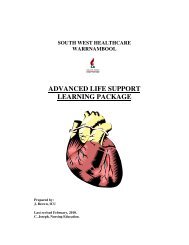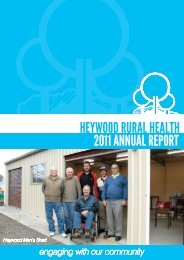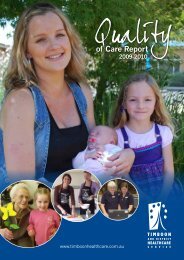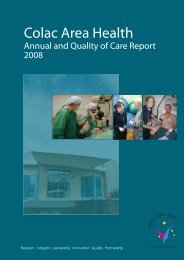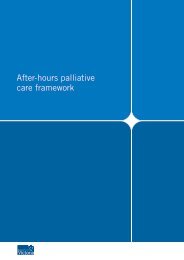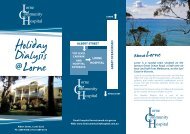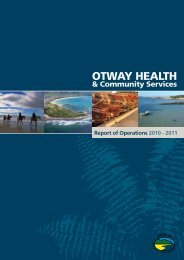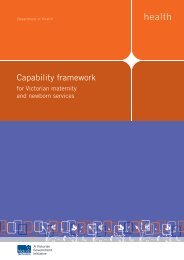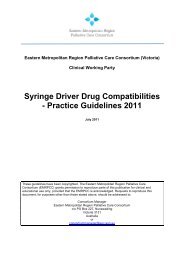Self Directed Learning Package - University of Queensland
Self Directed Learning Package - University of Queensland
Self Directed Learning Package - University of Queensland
- No tags were found...
Create successful ePaper yourself
Turn your PDF publications into a flip-book with our unique Google optimized e-Paper software.
122 • The Palliative Approach ToolkitPlanning aheadThinking PointWhen do you think discussions with residents andtheir family members about advance care planningshould be conducted? Immediately after admission?After several months? When a resident becomesterminally ill?Key PointAdvance care planning should be routine practicefor every resident soon after admission to aresidential care facility.It is never too early to consider, and write down, thoughts andwishes regarding end <strong>of</strong> life care. In fact, it is preferable toconsider these issues clearly and calmly when the matter is noturgent or critical.Most residential aged care facilities provide residents and familywith information about advance care planning on admission. Adiscussion between the resident (if able), family, nursing andmedical staff will <strong>of</strong>ten take place about this time. The outcomes<strong>of</strong> this discussion are recorded in the resident’s file.Key PointAdvance care planning should be seen as anongoing process rather than a single event.Writing it downIn the DVD, Bob wanted to make sure that everyone knewthat he did not want to be ‘kept alive’ with a ventilator if hisbreathing condition worsened again. We saw Bob talking withhis GP, nurse, wife and careworker about his wishes. He was keento ‘…get it down in writing’.Key PointHaving a written advance care plan or directive canimprove end <strong>of</strong> life care and reduce unwanted andunneeded medical treatments and hospitalisations.Advance directives are legal documents that record the resident’swishes about their care if they are unable to voice these wishesthemselves. They can also appoint a substitute decision maker,usually called a guardian or medical power <strong>of</strong> attorney.Key PointEvery Australian State and Territory has differentlegislation, guidelines and documents for advancecare planning, and where they exist, advancedirectives. The CareSearch website is a good placeto start to find out more: www.caresearch.com.auTable 1 displays an example <strong>of</strong> part <strong>of</strong> an advance healthdirective.Be mindful that the resident’s end <strong>of</strong> life care wishes need tobe revisited over time. Residents and families may change theirminds, or become clearer about their wishes concerning end <strong>of</strong>life options. Perhaps, like Bob, they have a distressing experiencewhere they are transferred to hospital and are anxious that thisnot happen again.



